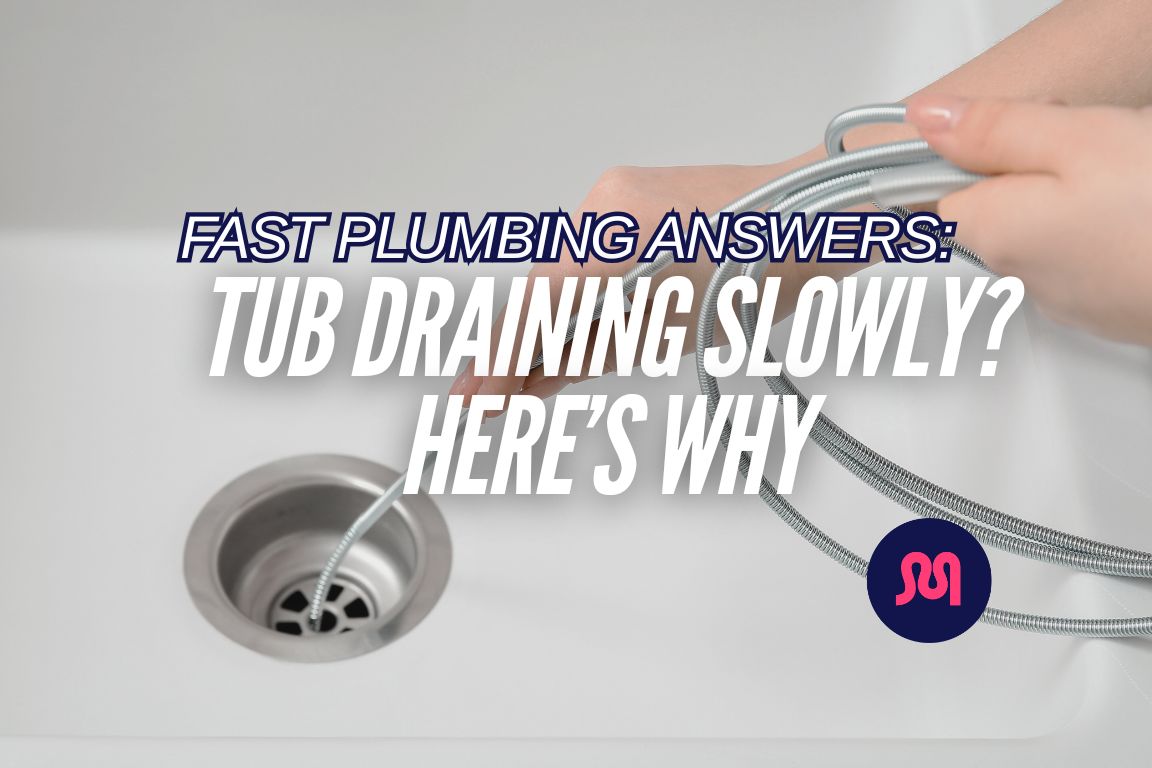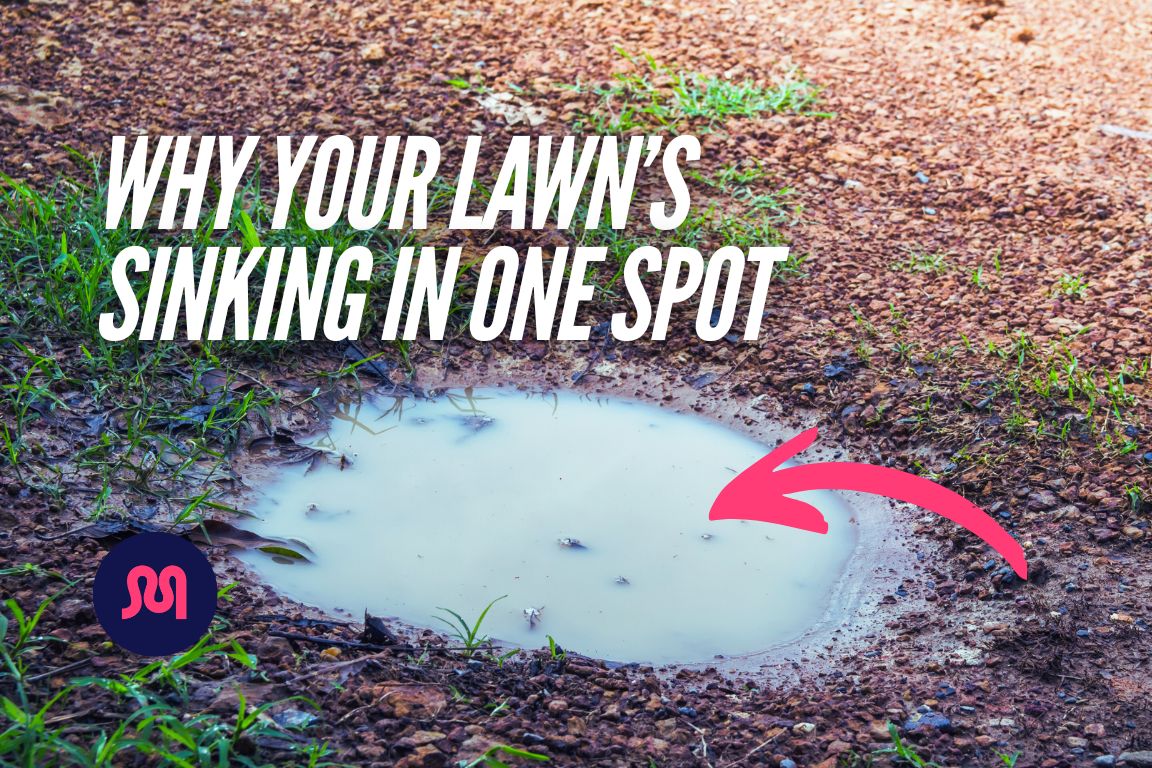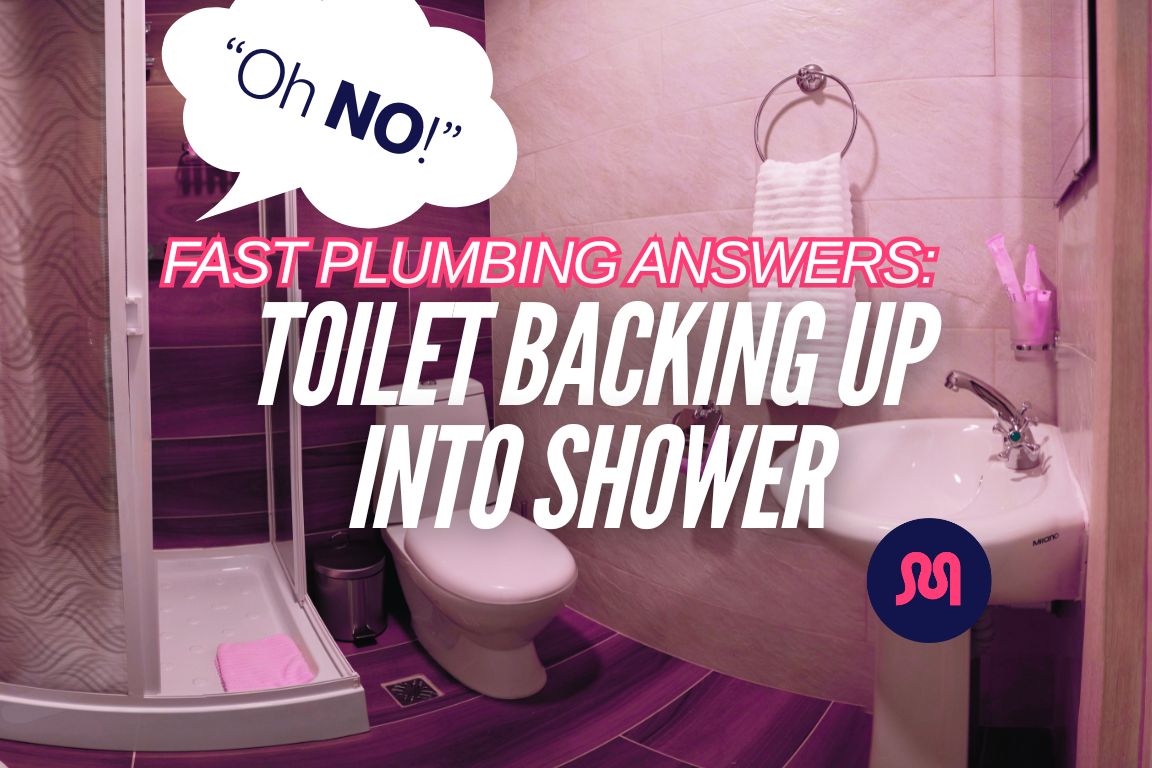Dallas Cast Iron Pipe Replacement Cost: Your Honest Guide

table of contents
table of contents
If you own a home in Dallas built before 1975, there's a good chance your main sewer line is made of cast iron. Cast iron pipes are useful for 50 years. But as their lifespan ends, they succumb to corrosion and deterioration — local clay soil, hard water and invasive tree roots speed up this process.
You’re reading this article because your old cast iron pipes are creating damp spots in your yard or sewage backups in your home. Is your plumber’s bid for sewer replacement fair?
The cost of replacing these cast iron pipes varies widely — as low as $3,000 for spot repairs, while replacing your entire sewer line can cost $60,000 or more. We’ll help define your specific cast iron problem, identify the proper long-term solution, and reveal an honest cost for the work.
Our plumbing experts combined over a century’s worth of knowledge and direct sewer repair experience to create this comprehensive guide to cast iron pipe replacement costs in Dallas.
Need your cast iron pipes replaced now? Call Mother 7 days a week anywhere in the Dallas-Fort Worth Metroplex for transparent estimates and expert care.
{{sewer-line-repair-and-replacement="/services/sewer-line-repair-and-replacement"}}
Understanding Your Cast Iron Sewer Line

Cast iron pipes were the standard for Dallas residential sewer lines from the 1950s until the late 1970s. They were prized for their strength and longevity compared to earlier materials.
Over time, the perceived strengths of cast iron as a sewer pipe material created significant weaknesses that led to its demise as a popular plumbing material. Its significant weight makes installation difficult, and its metallic nature leads to rusting, breaks and separations.
Cast iron pipes are also susceptible to internal corrosion from wastewater and external corrosion from soil, especially in the expansive clay soils common in the Dallas-Fort Worth Metroplex. This leads to scaling, cracks, root intrusion, and ultimately, failure.
Wondering if your home’s sewer lines need to be replaced? Read our comprehensive guide.
{{fast-plumbing-answers-how-long-do-cast-iron-pipes-last="/blogs/fast-plumbing-answers-how-long-do-cast-iron-pipes-last"}}
Cast Iron Pipe Replacement Cost: A Quick Guide for Dallas Homeowners
Here's a quick overview of what you can expect for cast iron pipe replacement cost based on the type of repair, specifically for Dallas residents. These figures represent average ranges for traditionally excavated repairs.
These cost averages are based on our internal price book data, what we’ve seen in local competitor’s bids, and direct input from our Master Plumber.
Note: These are estimated ranges for traditional excavation methods in the Dallas market and can vary significantly based on specific factors like pipe depth, location under concrete or landscaping, and ease of access.
Cast Iron Sewer Line Replacement: 6 Local Cost Drivers
6 key factors influence the cost of cast iron pipe replacement for your Dallas home. Recognizing these can help you understand the quotes you receive.
- Length of Damaged Pipe: How many feet of your sewer line are being replaced? The longer your section of damaged pipe, the greater the cost of materials, labor and excavation.
- Depth of the Pipe: The deeper your cast iron sewer line is buried, the more excavation is required. Deeper digs mean more labor, specialized equipment, and time, directly increasing the cost.
- Location on Your Property: Is the pipe under an easily accessible lawn, or does it run beneath concrete driveways, mature trees, patios, or even your home's foundation? Obstacles require more effort and time for removal and restoration.
- Extent of Damage: A single, isolated crack is far less costly to address than widespread corrosion, multiple breaks, or a collapsed section of pipe.
- Foundation Type: Dallas sewer replacement costs rise due to the prevalence of local concrete slab foundations. Access to repair sites is more difficult than pier and beam foundations. Tight spaces or areas difficult for machinery to reach will drive up costs.
- Restoration Needs: This is a major factor. After excavation, your yard, landscaping, concrete, or other disturbed areas will need to be restored. This can range from simple backfilling and reseeding grass to replacing entire concrete slabs or intricate landscaping features.
3 Types of Cast Iron Pipe Replacement: What’s Right For You?
When your cast iron sewer line needs attention, there are 3 primary repair and replacement options. Let’s examine what they are, their pros and cons, and best use cases.
Cast iron spot repair
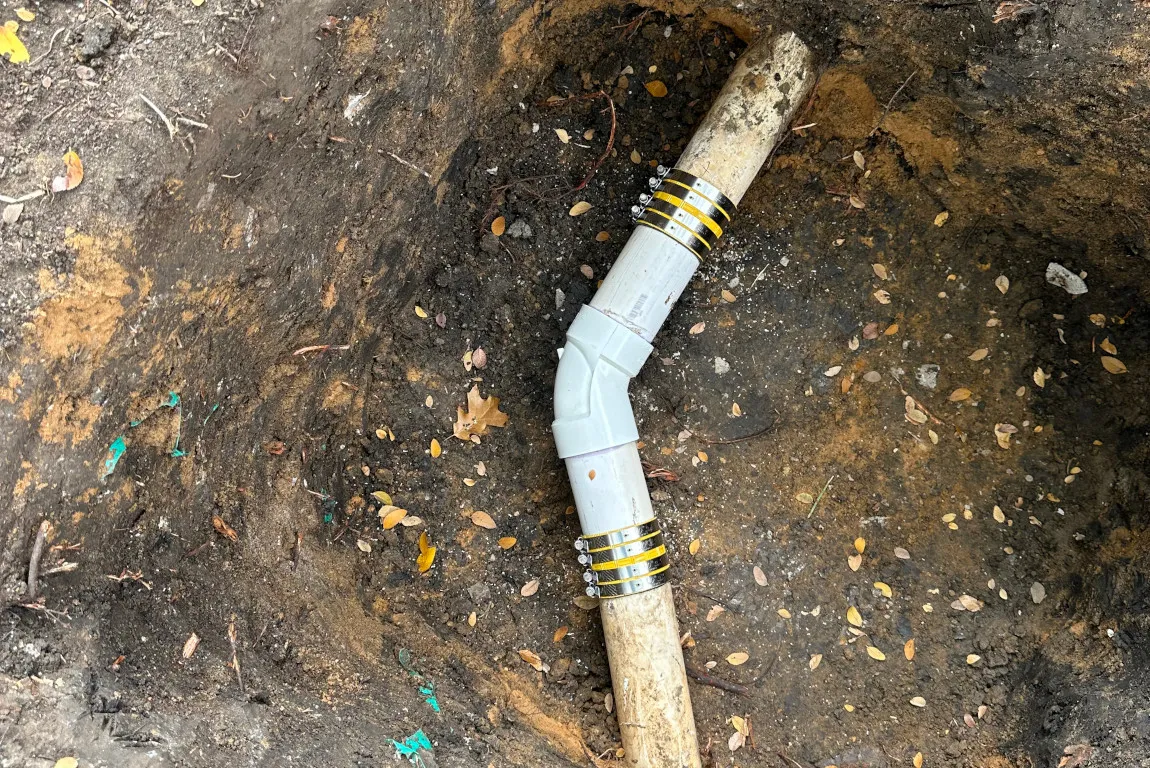
A cast iron spot repair is a highly targeted solution for a single, isolated problem area within your cast iron sewer line. It's used when a precise defect is identified, and the rest of the pipe is still in relatively good condition.
The process
After using a camera to precisely locate the specific defect, a focused trench is dug to expose only that small section of cast iron pipe.
The damaged part is then carefully cut out, and a new, durable segment of Schedule 40 PVC pipe is installed and securely connected to the existing cast iron. The excavated area is then backfilled and restored.
- Pros:
- Generally the lowest upfront cast iron pipe replacement cost for specific issues.
- Least invasive in terms of property disruption, as only a small area is dug up.
- Quicker to complete compared to larger replacements.
- Cons:
- Only fixes the identified spot; doesn't address overall deterioration of the cast iron.
- Other sections of your old cast iron pipe may fail in the future, leading to more repairs.
- Still requires excavation and restoration of the small disturbed area.
Cost of cast iron spot repairs
Expect the average spot repair to cost between $3,000 and $8,000 depending on the extent and severity of pipe damage.
Partial sewer line replacement
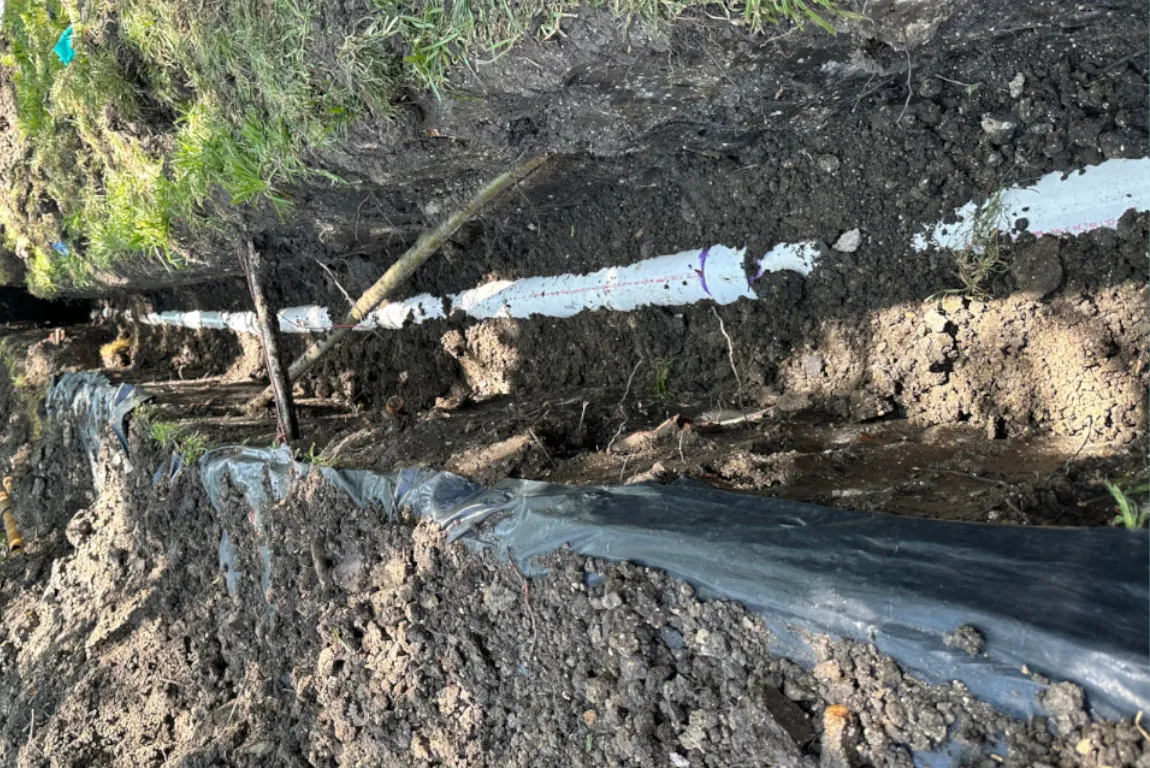
A cast iron partial sewer line replacement involves excavating and replacing a longer section of compromised cast iron pipe – typically anywhere from 10 to 50 feet – that is too extensively damaged for a simple spot repair but doesn't warrant replacing the entire line.
The process
Once the extent of the damage is confirmed with a camera inspection, a longer trench is excavated to expose the entire failing segment of cast iron pipe. This old section is completely removed and replaced with new Schedule 40 PVC piping.
Our expert plumbers ensure proper slope for drainage and make secure connections to the remaining healthy sections of your original line. The trench is then carefully backfilled, and the surface restored.
- Pros:
- Addresses more widespread issues than a spot repair, offering a more durable fix for significant damage.
- Can correct structural problems like pipe "bellies" (sags) or extensive root intrusion along a segment.
- More affordable than a full replacement, making it a common choice for specific long-run problems.
- Cons:
- More extensive excavation and property disruption than a spot repair, affecting a larger area of your yard or hardscape.
- Higher upfront cast iron pipe replacement cost compared to a spot repair.
- Still leaves other sections of older cast iron pipe in place, which could fail later.
Cost of partial replacement (cast iron)
Expect the average partial replacement of a cast iron sewer line to cost between $8,000 and $18,000 depending on the extent and severity of pipe damage.
Full sewer line replacement

A full cast iron sewer line replacement involves excavating and replacing the entire length of your main cast iron sewer pipe, from your home's foundation all the way to the municipal connection or your septic tank.
This is the most comprehensive solution, essentially giving you a brand-new sewer system for your property.
The process
This is the largest undertaking. A trench is excavated along the entire path of your existing cast iron sewer line. The old, failing cast iron pipe is completely removed from your property. A brand-new, continuous Schedule 40 PVC sewer line is then laid, ensuring perfect slope and secure connections. Once the new pipe is in place and tested, the entire trench is backfilled, and the surface areas are restored.
- Pros:
- Provides a completely new, highly durable sewer system for your home, made of modern Schedule 40 PVC.
- Eliminates all future concerns about your original cast iron pipe failing.
- Offers the longest-term peace of mind, with a lifespan of 50+ years for the new pipe.
- Often the best value in the long run if your entire cast iron system is nearing the end of its life.
- Cons:
- The highest upfront cast iron pipe replacement cost.
- Most extensive excavation and disruption to your property, potentially impacting landscaping, driveways, or other structures.
- Longer completion time compared to spot or partial repairs.
Cost of complete replacement (cast iron)
Expect the average complete replacement of a cast iron sewer line to cost between $10,000 and $30,000 depending on the extent and severity of pipe damage.
A note about cast iron pipe lining
It’s worth noting that pipe relining (CIPP) can sometimes be a useful temporary solution for specific cast iron sewer pipe issues.
CIPP lining creates a new pipe inside the existing one, then cures that smaller pipe in place. This process can seal small cracks, fill in missing sections, and prevent minor root intrusion without extensive digging.
However, it's crucial to understand that relining is a short-term fix for cast iron, as the underlying pipe will continue to deteriorate.
Eventually, all cast iron pipes will need full replacement due to widespread corrosion and structural issues.
Homeowners should always ask a trusted plumber to assess the remaining lifespan of their cast iron pipe before opting for a relining solution.
Discover the overall process of replacing cast iron sewer lines in our companion guide!
{{cast-iron-sewer-line-replacement-in-dallas-your-guide="/blogs/cast-iron-sewer-line-replacement-in-dallas-your-guide"}}
The Best Replacement Material: Schedule 40 PVC
When Mother’s plumbing experts replace failing cast iron sewer lines, we exclusively use Schedule 40 PVC piping. This material is widely recognized as the industry standard for modern sewer systems for several key reasons:
- Durability: Schedule 40 PVC is incredibly strong and resistant to corrosion, unlike cast iron.
- Smooth Interior: Its smooth inner surface promotes better flow, reducing the likelihood of clogs from debris or grease buildup.
- Flexibility: While rigid, it has enough flexibility to withstand minor ground shifts that can crack older, more brittle pipes.
- Root Resistance: Its tightly sealed joints prevent tree roots from infiltrating, a common culprit in cast iron failures.
- Longevity: Properly installed Schedule 40 PVC pipes are expected to last for over 50 years.
Choose Mother for Cast Iron Pipe Replacement in Dallas

Replacing a cast iron sewer line is a significant investment, and choosing the right plumber is crucial. At Mother, we pride ourselves on providing honest, transparent service for Dallas homeowners.
- Local Expertise: We understand the unique challenges of Dallas's expansive clay soils and older infrastructure.
- Precision Diagnosis: We utilize advanced camera inspection technology to accurately pinpoint the issues in your cast iron pipes, ensuring we recommend the right solution – not an overpriced guess.
- Quality Materials: We exclusively use high-grade Schedule 40 PVC for all our replacement work, guaranteeing a long-lasting repair.
- Comprehensive Service: Our team handles everything from excavation and pipe installation to thorough backfilling and property restoration, ensuring a smooth process from start to finish.
- Peace of Mind Warranty: We stand behind our work with industry-leading warranties, including a 20-year warranty on full repipes, giving you confidence in your investment.
📞 Dallas Residents: Upgrade Your Outdated Cast Iron Pipes
Understanding cast iron pipe replacement cost is the first step in addressing your home's aging sewer system. Whether you need a spot repair, a partial replacement, or a complete overhaul, trust Mother for a robust, long-lasting fix using superior Schedule 40 PVC piping.
Investing in a proper cast iron replacement provides long-term peace of mind and protects your home from future sewage nightmares.
Still not sure which option is right for your Dallas home? Ask our Master Plumbers to inspect your cast iron pipes, then walk you through the pros and cons with no pressure. Call Mother for an honest opinion and a long-term fix you can trust.
{{sewer-line-repair-and-replacement="/services/sewer-line-repair-and-replacement"}}
🙋 FAQs About Cast Iron Pipe Replacement
Do cast iron pipes have lead?
No, cast iron pipes themselves do not contain lead. However, lead was often used in the joints of older cast iron pipes, especially riser joints. Lead solder was also used in older buried cast iron lines. Any pipe containing lead materials must be replaced immediately.
{{fast-plumbing-answers-do-cast-iron-pipes-have-lead="/blogs/fast-plumbing-answers-do-cast-iron-pipes-have-lead"}}
Is cast iron pipe replacement messy?
Yes, traditional cast iron pipe replacement involves excavation, which can be messy. It requires digging a trench to access the pipe, which will disturb your yard, landscaping, or potentially hardscaping like driveways. However, a professional plumber will take measures to minimize disruption and restore your property as best as possible after the work is complete.
How long does a cast iron sewer pipe replacement last?
When your cast iron sewer pipe is replaced with modern Schedule 40 PVC, the new pipe is expected to last 100 years with regular care. This is a significant upgrade from the 50-75 year lifespan of cast iron, which is severely shortened by corrosion and root intrusion in the Dallas area.
Will my homeowner's insurance cover cast iron pipe replacement costs?
Generally, homeowner's insurance does not cover the cost of replacing pipes due to old age, wear and tear, or corrosion. However, if the pipe damage was caused by a sudden, accidental event (like a vehicle crushing the pipe, or a specific tree falling on it), there might be some coverage. It's crucial to review your specific policy and speak with your insurance provider.
Common Q’s about Drainage Service
Will my homeowner's insurance cover cast iron sewer line replacement in Dallas?
Coverage for sewer line issues varies greatly by individual homeowner's insurance policies. Many policies may cover damage caused by sudden and accidental incidents (e.g., a pipe burst due to an unexpected event).
However, damage resulting from gradual deterioration, aging, or lack of maintenance is typically not covered. It is crucial to review your specific policy documents or contact your insurance provider directly to understand your coverage.
Mother Modern Plumbing provides all necessary documentation to assist with any potential claims — including professional quotes, audio and video footage from inspections and leak detection service calls.
Is it better to repair or replace cast iron sewer pipes in Dallas?
The best course of action – repair or replacement – depends entirely on the extent and nature of the damage.
For isolated issues like a single crack or minor root intrusion, a spot repair or partial replacement might suffice.
Widespread deterioration, multiple collapses, significant channel rot throughout the system, or repeated, persistent problems require a full replacement or rerouting. This long-term solution provides peace of mind, especially given Dallas's challenging soil conditions.
Is cast iron pipe replacement messy?
Yes, traditional cast iron pipe replacement involves excavation, which can be messy. It requires digging a trench to access the pipe, which will disturb your yard, landscaping, or potentially hardscaping like driveways. However, a professional plumber will take measures to minimize disruption and restore your property as best as possible after the work is complete.
Can you scrap or recycle cast iron sewer pipe?
Absolutely. Cast iron is completely recyclable, and often has value at scrap yards.
Is relining cast iron pipes worth it?
Pipe lining in cast iron is like putting a Band Aid on a broken arm. You’re not addressing the root problem (outdated pipe materials), so your liner will eventually sustain damage.


